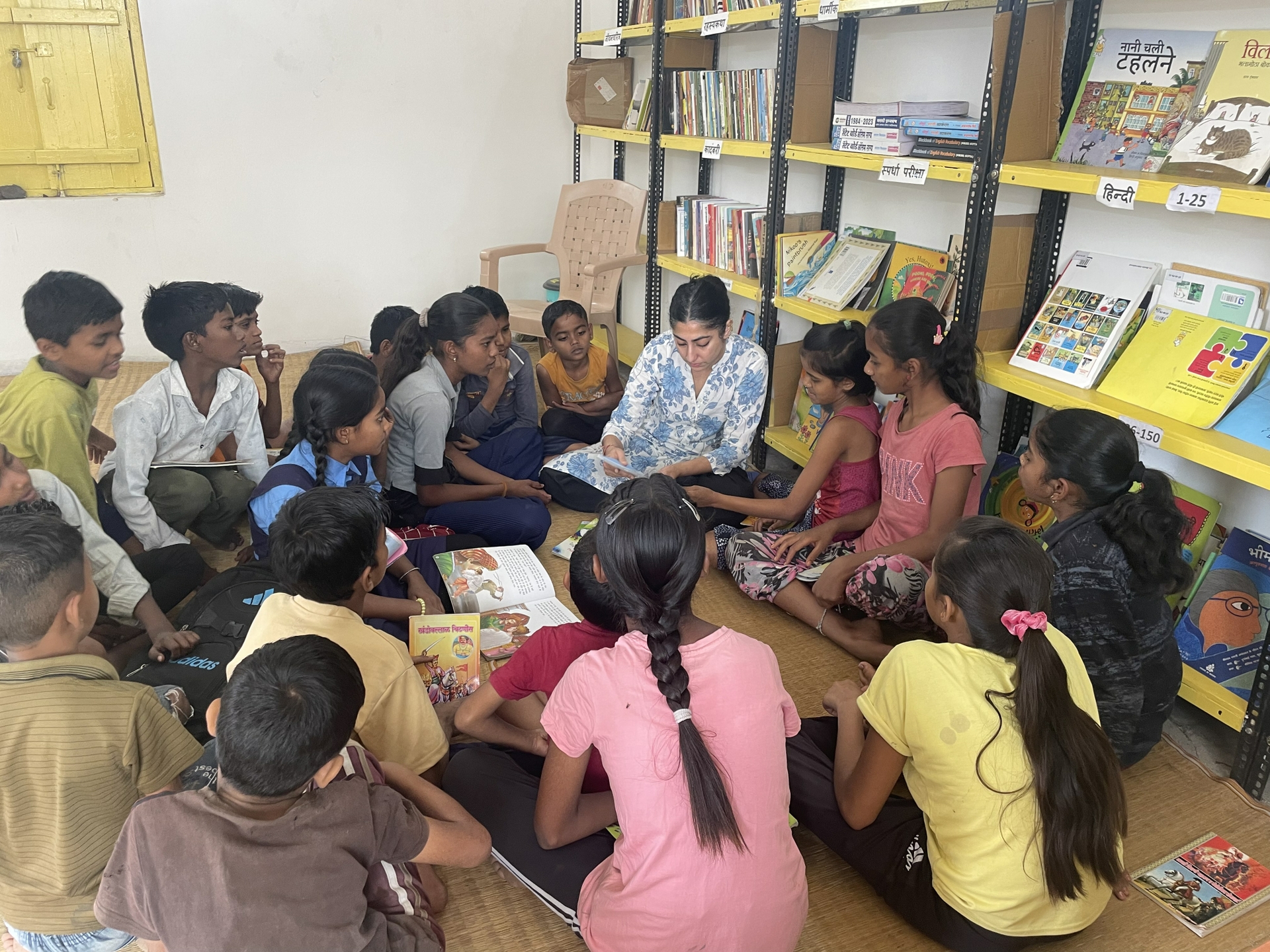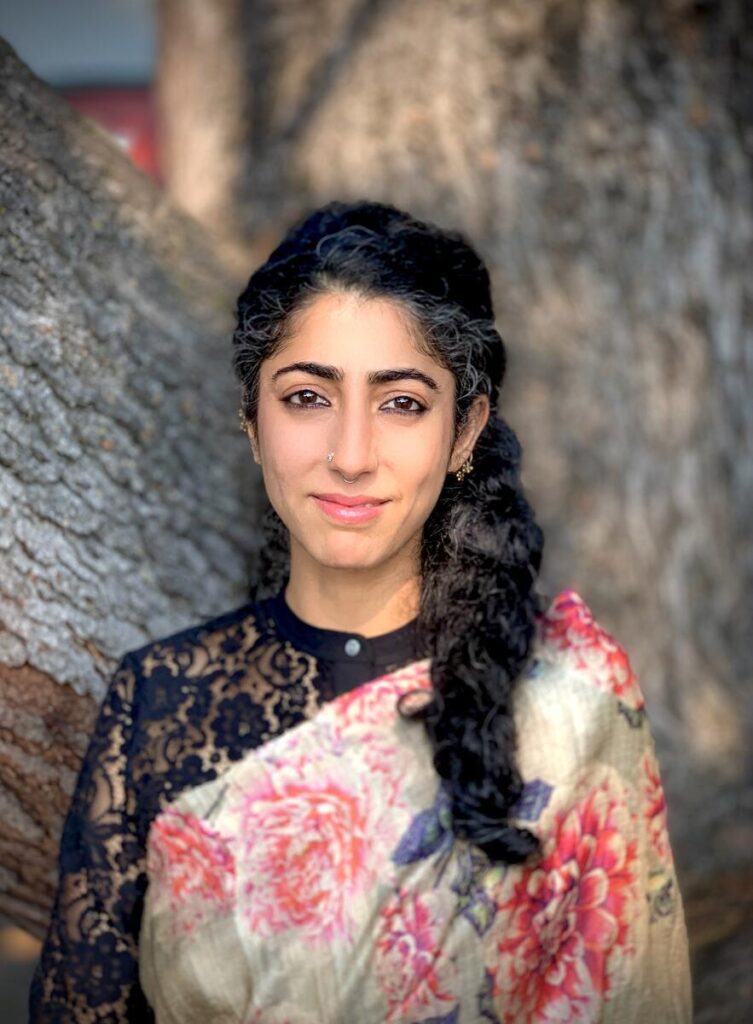From UC Berkeley to rural India, an anthropologist works to expand library access
Aarti Sethi, a UC Berkeley anthropology professor, is also helping digital-native students discover the importance of physical libraries.

Courtesy of Aarti Sethi
March 4, 2024
In her many years of fieldwork in rural central India, UC Berkeley Anthropology Professor Aarti Sethi pondered what could make a real difference in the lives of people there. She realized the answer was knowledge: a public library system, an asset scarcely available in the region, which would open doors to literacy and knowledge.
In India, there is no national public library system. Marginalized communities have little access to basic educational resources. Sethi’s realization of this disparity led to her involvement in the Free Library Network, a collective effort pushing for a national public library system in India. Along with her longtime collaborator, Indrajit Labhane of the Free Library Network, Sethi helped open the first community library in a small village in rural Maharashtra, a state in western India.

Courtesy of Aarti Sethi
The impact of this first library project was immediate and profound. Within two months, the library gained about 200 members, predominantly children, indicating a voracious appetite for reading and knowledge in the community. This initiative not only facilitated access to books, but also created a public space fostering learning and growth for first-generation readers.
“The joy of watching a child open a book for the first time in a library is indescribable,” Sethi said. “A library is not just about reading; it’s about opening doors to a world of possibilities that were previously inaccessible. I think what is so moving to me is to watch children travel with their imagination. A library says that you can be a child in a small village in central India and yet the whole world is open to you to think with, to travel in, to discover through books.”
Watching the small rural village’s enthusiasm and excitement about this library led Sethi to strive to build more libraries to benefit more first-generation readers, children whose parents didn’t go to school or dropped out at a young age. In India, there is no national policy for a public library system. Sethi and Labhane are part of an effort to draft a national policy on libraries for India. They’re also advocating for its introduction in the Indian Parliament.
Sethi said state-funded libraries must be a fundamental right.
“Libraries are more than just book repositories; they are vibrant hubs of learning and discovery, especially in areas where educational resources are scarce,” Sethi said. “Our mission in establishing these libraries is to ignite a love for learning and provide equal opportunities for knowledge access.”
She added that a library should be a basic social institution.
Libraries are more than just book repositories; they are vibrant hubs of learning and discovery.
Aarti Sethi, UC Berkeley professor
“When we say reading is a fundamental right, we mean something much larger than books,” Sethi said. “Particularly in countries like India, in which large sections of society have been denied access to education, information and knowledge, public libraries perform a critical role in creating a space for equal access to information. Libraries empower people’s ability to participate in society.”
UC Berkeley Library, a system of 20 libraries, holds materials in more than 400 languages and over 14 million volumes that are available to the campus community and the public. The importance of brick-and-mortar libraries, like those on campus, cannot be overstated, said University Librarian Jeffrey MacKie-Mason.
“Physical libraries are not book museums,” he said. “They are lively meeting grounds bringing together learners and experts who collaborate to find, evaluate and use the world’s knowledge to create better futures.”
At Berkeley, even with its easy access to a world-class library system, Sethi discovered that many of her students, who are accustomed to digital media, were unfamiliar with navigating physical libraries. This led to her integrating library orientation into her courses, with students exploring the stacks in UC Berkeley’s library system and engaging with physical books.

Courtesy of Aarti Sethi
These library expeditions revealed that the students were missing out on self-directed learning experiences and the joy of discovering knowledge through books. Her students wrote letters describing the joy of rifling through books on a shelf instead of scrolling on a screen.
“There is an experience that you get from wandering around the stacks that just does not compare to using a search engine, which is optimized and algorithmic,” one student wrote. “You can find so many interesting things that you did not even go into the library looking for.”
Added another: “The challenge with digital methods of exploring research was that the popularity of certain texts usually influenced the type of options that I was led to. … Thanks to this class activity, I was physically shown that the opportunity to take greater control over the knowledge I was exposed to sat within the thousands of rows of texts housed in the libraries.”
Sethi said she hopes library orientation, particularly how to navigate the stacks, can become a standard part of undergraduate education, enabling students to fully utilize the rich resources available to them.
Sethi’s experiences in India and the U.S. highlight a global challenge in knowledge access and literacy. In India, the struggle lies in the absence of a structured public library system, whereas in the U.S., the issue is more about reacquainting students with the value of physical libraries in an increasingly digital world.
“In both rural India and at UC Berkeley, I’ve seen the transformative power of libraries,” Sethi said. “Whether it’s introducing first-generation readers to books or helping digital-native students discover the depth of physical libraries, these spaces are essential for nurturing informed, curious and engaged learners.”